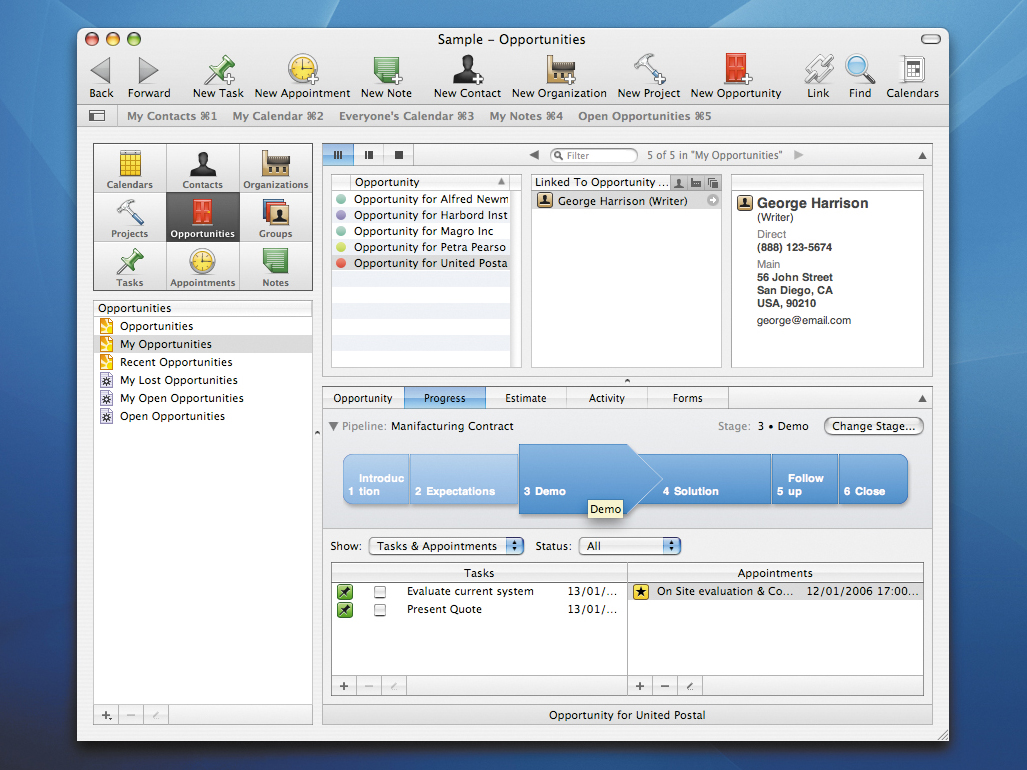TechRadar Verdict
A complete raft of tools for managing contacts in a Mac business environment
Pros
- +
Strong online community
Stable
Excellent interface
Works with many PDAs
Integrates with Mail
Cons
- -
Pricey telephone support
Why you can trust TechRadar
Has it been a year already since we last reviewed Daylite? Time flies. Back then, we had an exclusive sneak preview of the beta version of Daylite 3.0, just before the full release. Since its launch, two updates have come along, including a new quick-glance calendar and, in this latest one, a bunch of tweaks to the database.
Daylite, in a nutshell, is one of the few reliable CRM (customer relationship management) applications for the Mac. It competes well against Contactizer 3 Pro, Redlien Account Executive and other apps that come and go, but distinguishes itself with an enviable following of supporters that other releases can't seem to match. It costs £99 for a single user, £439 for five users and £859 for ten.
The updates
Daylite resides on a Mac and works with any PDA that's iSync-compatible, including BlackBerry, Pocket PC and Palm handhelds, and will work with the Apple iPhone when it gets its UK release towards the end of the year. As such, Daylite is a key enabler for sales staff from a Mac work group who want to securely link to team members back in the office. Contacts and correspondence from Mail can be lifted straight into Daylite's relational database, where all kinds of information can be added - projects, schedules, meetings and reports.
The latest updates have brought new menu items and keyboard shortcuts. The quick-glance calendar feature arrived in version 3.1. On the database side, indexing bugs have been fixed, and new options for linking contacts on import have been built in. Also, in ReportDesigner, which is used to monitor the progress of relationships, there are new ways to visualise contacts, organisations, projects and opportunities. The other updates are a bunch of fixes and tweaks, mostly to do with merging databases.
Unlike some other Mac contact managers, which quickly run out of steam on the support side - or have the feel of Windows software shoehorned to work on a Mac - Daylite has reliable, if expensive, paid-for support. It also boasts an excellent online community and a superb, Mac-like look and feel. It's that online community that really makes the software appealing. In the month that we tested the beta, we didn't really get enough time to appreciate this resource; since then, it's become our first port of call.
Training tribulations
However, training and support could be improved. Telephone support is quite costly: a year's worth of support is $269 (£135), and your company is only allowed one technical contact, which is restrictive. Email support is free, but it typically takes two days to get a reply to your query.
Training is limited, but in fairness this software is pretty intuitive - it works naturally with the Mac. It doesn't take long to get a feel for it, which is lucky, because only four short training videos are available though the Marketcircle website. Luckily, or perhaps by design, the community forums have taken up the slack and are very responsive to newcomers.
Sign up for breaking news, reviews, opinion, top tech deals, and more.
There are other areas that could be enhanced. Daylite has a detailed calendar and scheduling section, and a quick-glance calendar that slides out to the right of the Mail panel. It would be great if the two areas could be linked so that priority days show up as colour-coded in the quick-glance section.
Niggles aside, we're impressed by Daylite, and it's great to see how robust this program has become.
Tech.co.uk was the former name of TechRadar.com. Its staff were at the forefront of the digital publishing revolution, and spearheaded the move to bring consumer technology journalism to its natural home – online. Many of the current TechRadar staff started life a Tech.co.uk staff writer, covering everything from the emerging smartphone market to the evolving market of personal computers. Think of it as the building blocks of the TechRadar you love today.
